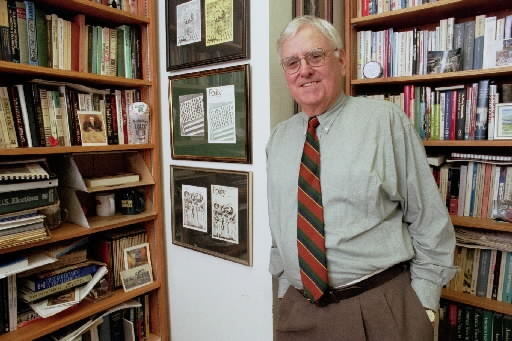President Barack Obama leaves office Friday around noon. It was a presidency many Americans — and many New Englanders — thought impossible just a few years earlier. Even some of his early supporters from the area had their doubts.
Retired UMass Amherst political scientist Jerry Mileur has lived in Western Massachusetts for nearly 50 years. But he is a Southern Illinois boy at heart.
And several years ago, “I was actually driving back to Illinois and I heard a radio broadcast that this fellow named Barack Obama was running [for office], and I remember thinking that, boy, with a name like that, how’s he going to win in lllinois?”
But Mileur asked around about Obama — to his friends and fellow academics, to Democrats and Republicans.
“Because everyone had spoken so favorably about him, I decided that was someone I wanted to support,” he said.
And so in August of 2004, Mileur donated $1,000 to Obama’s U.S. Senate campaign, in a race he easily won. Mileur thought well of Obama, but did not see his next step coming.
“Heavens no,” he said.
Still, Mileur kept writing checks, and Obama kept winning. And now, more than a dozen years after that road trip:
“Well, it’s been a very tough presidency,” he said. “I think the first couple of years, when he had a Democratic Congress, they got a lot of things done: the healthcare, the jobs programs.”
But the achievements slowed under a GOP Congress, and the president has acknowledged he could’ve done a better job at communicating.
“I don’t think he will be in the first rank in presidents,” Mileur said. “But he will certainly be in the second rank.”
And one thing no one can take from him, Mileur said, is Obama’s place in history as the first African American in the White House — something Mileur never thought he’d get to witness.
But Sheree Biggs saw it coming.
“The first time I learned about Barack Obama was actually on Oprah,” Biggs recalled.
Biggs was then a student at Westfield State. She liked what she saw, what she heard and what Obama could represent.
Biggs is an immigrant from Jamaica, she said,”So, it’s not like my first time seeing a black president in office.”
But in the U.S.? Biggs said her mom, for one, was skeptical during that 2008 campaign.
“I think in her mind she was like, ‘Oh, it’s not going to happen because he’s African American,’ and I’m like, ‘Mom — the only way it’s going to happen is if you actually go out there and vote,'” Biggs said.
Biggs did more than vote. While going to school, she volunteered for the Obama campaign, even traveling to New Hampshire.
MASSLIVE ARCHIVE: Western Mass. residents cross state lines for presidential candidates
Biggs is now 32, works at a titanium company in Hartford, and she’s also in the Air Force Reserves — at Westover.
“I serve in the military, so at the end of the day, he is my boss,” she said.
And she’s proud of him. She calls the Affordable Care Act “monumental,” but a key part of Obama’s legacy, she said, is the unity and excitement he inspired in that first presidential campaign..
“And it was not just for the color of his skin,” she said. “Just because we as people wanted a change, and we were motivated and we were passionate because we felt our voices were finally being heard.”
And now that legacy, she said, is part of her own legacy.
“To say to my daughter and my son in the future, ‘I was a part of making that vote happen,'” she said.
It was a vote that — for a while at least — Tatishe Nteta thought unlikely. He’s a political scientist at UMass Amherst and before the 2008 primaries, he examined data that showed a gap between what white voters tell pollsters and how they actually vote when a black candidate is on the ballot.
Back then, he wrote a column in the Daily Hampshire Gazette, doubting that Obama could change that trend.
“I couldn’t have been more wrong in terms of my assessment of Obama’s chances in 2008,” Nteta said this week.
Nteta said he was happy to be wrong.
“My parents came from South Africa. They fled an apartheid government to come to the United States,” he said. “And it was extremely emotional to see the nation’s first African American president, whose parents — or at least one of his parents — was from Africa — get to the pinnacle of the political system.
And that, Nteta said, along with his Supreme Court picks and a host of legislative achievements, will be “the defining aspect” of Obama’s legacy.
